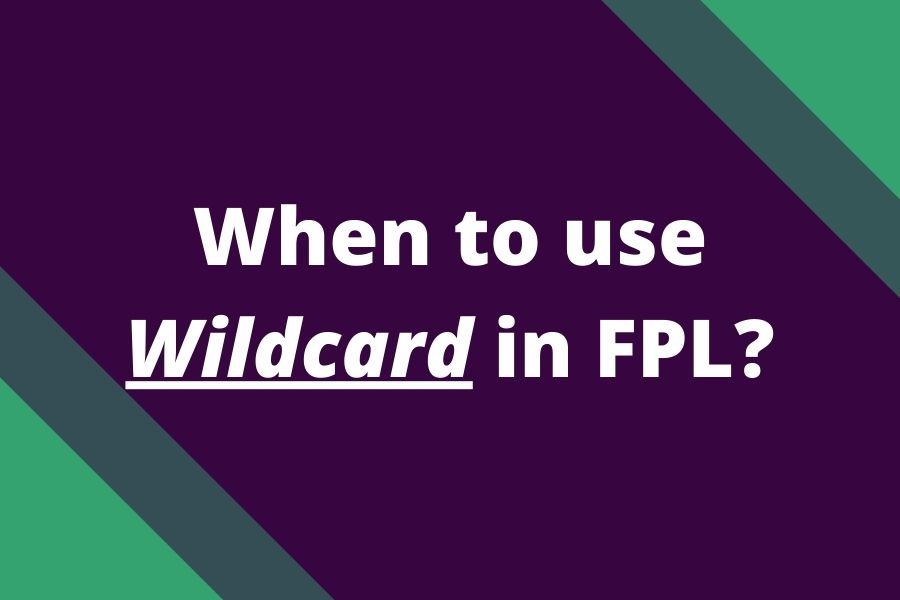When is the best time to use the wildcard chip in FPL?
One of the most crucial decisions an FPL manager has to make during Fantasy Premier League season is when to use their wildcard. So, let’s look at when are the best opportunities to exploit the maximum potential of this powerful chip.
This article is a part of our series: What is Wildcard in FPL and how does it work?
When to use Wildcard in FPL 2023/24?
Second Wildcard (Possible to activate between GW21 – GW38)
Second Wildcard in Gameweek 30 – a good option for managers who also have a free hit available
- For managers who dead-ended their team into big blank gameweek 30
- A Wildcard in GW30 right after the blank will allow you to rebalance the squad after bringing in “weaker” players for blank gameweek 29
- You could either set up your squad directly for DGW37 with aim to use bench boost here, while using free hit in GW34 (as different teams will double in GW34 and GW37)
- Or you could use the opposite approach to build a squad toward DGW34, use bench boost here, and then use free hit in GW37
Second Wildcard in GW35/GW36 – a good option for managers who do not have free hit available
- For managers who will not use free hit in GW34.
- Good for managers who will dead-end their team into double gameweek 34
- GW35 wildcard allows you to rebalance the squad after dead ending team into GW35
- You would load up on DGW37 players
- The disadvantage is, that it is a very late wildcard, so it will affect your team for 4 weeks only
- this is currently our preferred option, see our chip strategy
See the fixtures in a bigger perspective in our FPL calendar.
Read more: When do you get the Second Wildcard in FPL?
First Wildcard (Possible to activate between GW2 – GW20)
Here are our first thoughts on the best times to use the first wildcard in the 2023/24 season.
A forced wildcard in GW9:
- During second international break
- we will have a lot of data about the season
- We should know at that time who the best players to own are, who the bargains are, what is the preferred formation etc
- You would get rid of Chelsea players whose fixtures worsen
- Great time to bring in Aston Villa assets (Watkins + one defender), Liverpool and Spurs assets
- Suitable for: if you have Chelsea players you need to get rid of and do not have Man. United or Brentford players you would get their last chance in GW10
A delayed wildcard in GW10:
- Price rises could be an issue in comparison with managers who used their wildcard early in GW9
- you can take a one week punt or differential for GW9 and then wildcard him out in GW10
- Good if you have Tottenham and Liverpool coverage for GW9
- You can load up on Arsenal and Brighton players who were bit overlooked recently (+Crystal Palace)
- Suitable for: You got your Man. United or Brentford player’s last chance in GW10
Pre-blank wildcard in GW18
- A good wildcard strategy for those managers who have too many injured, suspended players or too many Brentford and Man. City players in GW18
- However, it could limit your team as you would likely would not pick any Man. City players, and you would have to book a transfer for Haaland in GW19
A late wildcard in GW19:
- GW18 will be a blank gameweek (City and Brentford do not play)
- You can dead-end your team into GW18, sell your Manchester City, Brentford players right before GW18, and then bring them back with your wildcard
- We will have a lot of data about the season at this point
- Suitable for: If you have a really good start to the season and did not need to use wildcard earlier
Pre-AFCON, Asian Cup First Wildcard in GW20
- The last chance to use the first Wildcard
- Good strategy if your team is in perfect shape for blank GW18, and GW19 as well
- This strategy could help you rebalance the squad before the AFCON start (GW21)
- a good strategy for managers with too many AFCON players (and the first wildcard available). But you would be without AFCON players for one gameweek – GW20, as AFCON starts in GW21, and you would have to activate the wildcard before the GW20 deadline (where players missing due to AFCON and Asian Cup later will play)
*Note: The last gameweek you can activate your first wildcard is GW20. Read more: When does the first wildcard expire in FPL?
See the fixtures in a bigger perspective in our FPL calendar.
Key Moments to Use a Wildcard in Fantasy Premier League
Knowing when to use these wildcards can be the difference between a good and a great FPL season. There are certain moments in the Premier League campaign when using a wildcard can be particularly advantageous:
1. Right Before Double Gameweeks (2nd wildcard)
One such moment is during Double Gameweeks. These are Gameweeks where some teams play more than once, providing an opportunity for managers to earn extra points.
Using a wildcard before Double Gameweek allows managers to bring in players who have more than one match, maximizing their potential points return.
Usually, double gameweeks occur mainly in the second half of the season, so this is particularly good timing for the second wildcard.
Read more: When is the next Double Gameweek in FPL?
2. After you dead-end your team into blank gameweek (2nd wildcard)
Another possible time for using the second wildcard is after the blank gameweek (unless you use a free hit chip in the blank gameweek). Blank gameweek occurs when some teams do not play at all in that round, so some of your players might not play.
So, the pretty common strategy is, that a few weeks before the blank gameweek you start offloading players who do not play in the blank gameweek making sure you can field 11 starting players.
But the players you sell, are perhaps players you want once the blank gameweek is over.
So you will use wildcard after the blank gameweek – you get rid of all the mess in your team, all players that you brought in just because they had a game in a blank gameweek, and bring balance back to your squad.
3. During the international break (1st wildcard)
Another possible moment to use a wildcard could be during an international break. International breaks often lead to injuries and fatigue among players, which can disrupt an FPL team. Using a wildcard during an international break allows managers to replace injured or tired players and react to any changes in player form or team dynamics.
But make sure you activate the wildcard at the beginning of the international break (at the start of the new gameweek) to catch some price rises during 14 days long period.
Read more: When are international breaks in FPL 2023/24 season?
4. During fixture swings (1st wildcard, 2nd wildcard)
“Fixture Swing” refers to a period in the schedule where a team’s fixtures shift from being particularly difficult to notably easier, or vice versa. This is important for FPL managers because it can significantly impact player performance and, therefore, fantasy points.
For example, if a team has a run of games against top-tier teams and then shifts to a series of matches against lower-ranked teams, this is considered a positive fixture swing. FPL managers might consider bringing in players from this team ahead of the fixture swing to take advantage of the potentially easier matches and the opportunity for players to score more points.
Conversely, if a team’s schedule is about to become more difficult, FPL managers might consider transferring out players from that team to avoid potential low scores.
Each season, there are a few gameweeks, where a lot of teams experience the fixture swing at the same time. This is a great opportunity to use especially 1st Wildcard as you can ditch all players who will face tough fixtures in the upcoming gameweeks and replace them with players whose upcoming fixtures just turned green.
Read more: Flat Track Bully Index Explained
5. When your team is full of injuries and suspensions
Finally, some managers choose to activate their wildcards when their team is full of injured or suspended players.
But before you decide to do this, first make sure the problem cannot be solved with a couple of hits. Many times, saving wildcard for double gameweeks or fixture swings is more rewarding.
6. When you need to revert big points hit
If you accidentally took something like a -48 points hit, you could revert in by playing your wildcard or free hit chip. It is far from ideal, as this will limit your ability to adapt to the schedule of blanks or double gameweek, but if you accidentally took a big hit these are the only solution to revert it.
7. Always try to use your wildcard for tactical purposes and not the emotional ones
You can read more about this in our separate article: Essential tips for effective use of Wildcard in FPL
When NOT to use the wildcard
a) When you are chasing past points
It is almost a never good idea when you use a wildcard just because you are chasing the past performance. Remember, if you just chasing the past with your wildcard, you will only have the same team as other managers already got before you.
You end up having the same players on your team as they do, but other FPL managers brought them to their teams way before you, so they were rewarded points, and you did not. This leads to less differentiation and can limit your potential to gain points.
b) When you are angry
Never use a wildcard just because you are angry because your team did not perform well in that gameweek. FPL is unpredictable, in the next gameweek it could be just the other way around.
Rage wildcard activations almost never pays out. Do not let emotions to stay in your way when making important FPL decisions.
Read more: Tips How To Enjoy FPL Without Sacrificing Mental Health
c) After the gameweek 1
The Fantasy Premier League Gameweek 1 is almost always a mess. So try to avoid using wildcard after gameweek 1. Here is why:
- Limited information: Gameweek 1 is just the beginning of the season, and there is limited information available about player performances and team dynamics. It’s difficult to assess the true potential of players and teams based on just one or two matches. Making drastic changes to your team based on such limited data can be risky and lead to poor decision-making.
- Overreacting to one week: The first week of the season can be particularly unpredictable. Teams and players may still be adjusting to new tactics, formations, or even newly signed players. It’s important not to overreact to a single good or bad performance. Making wholesale changes to your team based on one week’s results may result in missing out on players who could potentially perform well in the long run.
- Wait a few gameweeks: It’s crucial to consider upcoming fixtures and trends before using a wildcard. By waiting a few weeks, you can gather more information about team form, player injuries, and the difficulty of upcoming matches. This additional knowledge allows you to make more informed decisions and select players who have favorable fixtures or are in good form.
- Flexibility later in the season: By delaying the use of your wildcard, you have the advantage of greater flexibility later in the season.
Conclusion
The wildcard is a powerful tool in FPL, offering the flexibility to make unlimited transfers and the potential to drastically improve your team. However, it’s not just about having the wildcard; it’s about how and when you use it. With careful planning and strategic use, the wildcard can be the difference between a good and a great FPL season. So, plan wisely, play strategically, and may your wildcard bring you many points!




